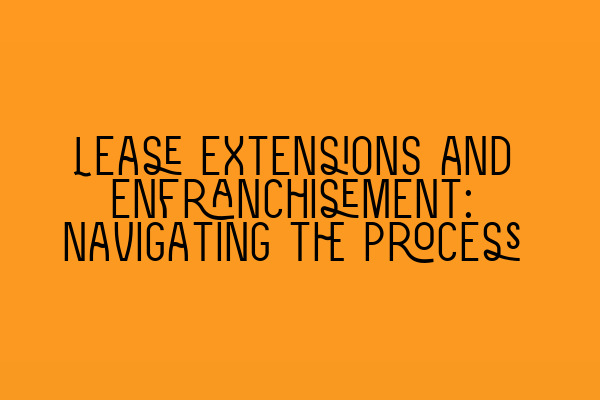Lease Extensions and Enfranchisement: Navigating the Process
If you own a leasehold property, you may find yourself in a situation where your lease is approaching its expiration date. In such cases, it is crucial to understand the process of lease extensions and enfranchisement, as they can greatly impact your property rights and financial well-being. In this blog post, we will guide you through the process and help you navigate the complexities of lease extensions and enfranchisement.
What are Lease Extensions and Enfranchisement?
Lease extensions and enfranchisement are legal processes that allow leaseholders to extend the length of their lease or acquire the freehold interest of the property. These processes provide leaseholders with greater control over their properties and can also enhance the value of their assets.
Lease Extensions:
Lease extensions are primarily applicable to leasehold flats or apartments. As a leaseholder, you have the right to extend the length of your lease once you have owned the property for at least two years. Extending your lease will grant you the right to remain in the property for an extended period and enjoy the benefits of full ownership.
The process of lease extensions can be complex, involving legal and financial considerations. It is advisable to seek the assistance of a qualified solicitor who specializes in property law to guide you through this process. They will ensure that you meet all the legal requirements and help you negotiate favorable terms with the freeholder.
Enfranchisement:
Enfranchisement, on the other hand, involves leaseholders collectively purchasing the freehold interest of the property they reside in. This process is applicable for properties with multiple leaseholders, such as blocks of flats or houses divided into separate leasehold units.
Enfranchisement provides leaseholders with greater control over the management and maintenance of their properties. By acquiring the freehold interest, leaseholders become members of a residents’ association, giving them the power to make decisions regarding the property’s upkeep, service charges, and major works.
The Process of Lease Extensions and Enfranchisement:
1. Initial Assessment: Before initiating the lease extension or enfranchisement process, it is essential to assess your eligibility, the current lease terms, and seek professional advice. A specialist property law solicitor can help you evaluate the potential benefits, costs, and complexities involved.
2. Valuation: In both lease extensions and enfranchisement, it is crucial to determine the value of the lease or freehold interest. A qualified surveyor or valuer experienced in leasehold properties can assist with this step. The valuation report will provide a sound basis for negotiations with the freeholder regarding the premium payable.
3. Notice and Response: Once the preliminary assessments and valuations are complete, you will need to serve the appropriate notice on the freeholder, informing them of your intent to extend the lease or acquire the freehold. The freeholder has a specified period to respond and initiate negotiations.
4. Negotiation: Negotiating the terms of lease extensions or enfranchisement is a crucial step in the process. It involves determining the premium payable to the freeholder, as well as other terms such as lease length, ground rent, and service charges. Skilled negotiation is paramount to securing favorable terms and avoiding unnecessary disputes.
5. Legal Documentation: Once the terms have been agreed upon, your solicitor will prepare the necessary legal documentation, including a lease extension agreement or a collective enfranchisement claim. These documents must be carefully drafted to protect your rights and ensure a smooth transition of ownership or lease terms.
6. Completion: Upon signing the legal documentation, the process is complete, and you can enjoy the benefits of the extended lease or freehold interest. It is advisable to update your property records, notify relevant parties, and ensure compliance with any post-completion requirements.
Conclusion:
Lease extensions and enfranchisement can significantly impact your property rights and investment. Navigating the process requires a comprehensive understanding of property law, negotiation skills, and professional support. By seeking the assistance of a qualified property law solicitor, you can effectively navigate the complexities of lease extensions and enfranchisement, ensuring a favorable outcome and securing your property’s long-term value.
To prepare for the SQE exams in property law, we recommend checking out our related articles on SQE 1 Practice Exam Questions, SQE 1 Practice Mocks FLK1 FLK2, SQE 2 Preparation Courses, and SQE 1 Preparation Courses. Stay updated on the latest SRA SQE Exam Dates to plan your preparation effectively.
By choosing SQE Property Law & Land Law as your trusted legal partner, you can confidently navigate the process of lease extensions and enfranchisement. Contact us today to learn more about our services and how we can assist you in securing your property rights.
